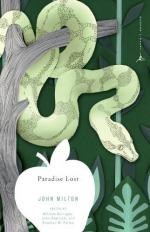|
This section contains 1,388 words (approx. 5 pages at 300 words per page) |

|
"Paradise Lost": An Epic to Surpass All Epics
The epic poem Paradise Lost by John Milton was written during a time of religious revolution in England. The subject matter of this epic poem, in the words of Milton, is "[o]f man's first disobedience" (line 1). In this blank verse, Milton refers to the story in Genesis where Eve tempts Adam to eat the "forbidden fruit." In the first five lines of the poem he describes the beginning of mortality, suffering, and man's restoration, as "the fruit [o]f that forbidden tree, whose mortal taste [b]rought death into the world, and all our woe, [w]ith loss of Eden, till one greater Man [r]estore us, and regain the blissful seat" (lines 1-5). "[D]eath" is human mortality, and "all our woe" is man's suffering (line 3). When he says "till one greater Man [r]estore us," Milton is referring to...
|
This section contains 1,388 words (approx. 5 pages at 300 words per page) |

|


